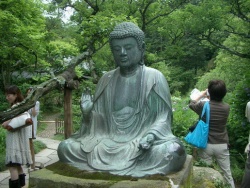Difference between revisions of "Agama sutras"
(Created page with "thumb|250px| <poem> '''Agama sutras''' [阿含経] (Skt, Pali; Jpn Agon-gyo ) A group of sutras containing Shakyamuni's earlier teachings, which Mah...") |
|||
| (4 intermediate revisions by the same user not shown) | |||
| Line 1: | Line 1: | ||
[[File:Tokeijid.jpg|thumb|250px|]] | [[File:Tokeijid.jpg|thumb|250px|]] | ||
| + | |||
| + | |||
| + | |||
| + | |||
| + | |||
| + | |||
| + | |||
| + | |||
| + | |||
| + | |||
| + | |||
<poem> | <poem> | ||
| − | + | [[Agama sutras]] | |
| − | [阿含経] (Skt, Pali; Jpn Agon-gyo ) | + | [[阿含経]] (Skt, [[Pali]]; Jpn [[Agon-gyo]] ) |
| + | |||
| + | A group of [[sutras]] containing [[Shakyamuni's]] earlier teachings, which [[Mahayanists]] later categorized as [[Hinayana]]. [[Agama]] means "teachings handed down by [[tradition]]." The {{Wiki|Chinese}} [[Agama sutras]] comprise four groups, each containing a number of [[sutras]]. | ||
| + | |||
| + | The four groups, or the four [[Agama sutras]], as they are commonly known, are the Long [[Agama Sutra]], the Medium-Length [[Agama Sutra]], the Miscellaneous [[Agama Sutra]], and the [[Increasing by One]] [[Agama Sutra]]. | ||
| + | |||
| + | [[Theravada Buddhism]] bases itself on the five [[Agamas]] of the [[Pali canon]], which are similar in composition to the four {{Wiki|Chinese}} [[Agama sutras]]. | ||
| + | |||
| + | The five [[Agamas]] are [[Digha-nikaya]] (long [[sutras]]), [[Majjhima-nikaya]] ([[medium-length sutras]]), [[Samyutta-nikaya]] ([[sutras on related topics]]), [[Anguttara-nikaya]] ([[sutras]] of numerical [[doctrines]]), and [[Khuddaka-nikaya]] (minor [[sutras]]). | ||
| + | |||
| + | [[Nikaya]] means group or collection. | ||
| + | |||
| + | The first four correspond respectively to the {{Wiki|Chinese}} Long [[Agama]], Medium-Length [[Agama]], Miscellaneous [[Agama]], and [[Increasing by One]] [[Agama sutras]]. | ||
| − | + | See also; five [[Agamas]]; four [[Agama sutras]]. | |
</poem> | </poem> | ||
{{R}} | {{R}} | ||
Latest revision as of 14:19, 1 February 2024
Agama sutras
阿含経 (Skt, Pali; Jpn Agon-gyo )
A group of sutras containing Shakyamuni's earlier teachings, which Mahayanists later categorized as Hinayana. Agama means "teachings handed down by tradition." The Chinese Agama sutras comprise four groups, each containing a number of sutras.
The four groups, or the four Agama sutras, as they are commonly known, are the Long Agama Sutra, the Medium-Length Agama Sutra, the Miscellaneous Agama Sutra, and the Increasing by One Agama Sutra.
Theravada Buddhism bases itself on the five Agamas of the Pali canon, which are similar in composition to the four Chinese Agama sutras.
The five Agamas are Digha-nikaya (long sutras), Majjhima-nikaya (medium-length sutras), Samyutta-nikaya (sutras on related topics), Anguttara-nikaya (sutras of numerical doctrines), and Khuddaka-nikaya (minor sutras).
Nikaya means group or collection.
The first four correspond respectively to the Chinese Long Agama, Medium-Length Agama, Miscellaneous Agama, and Increasing by One Agama sutras.
See also; five Agamas; four Agama sutras.
